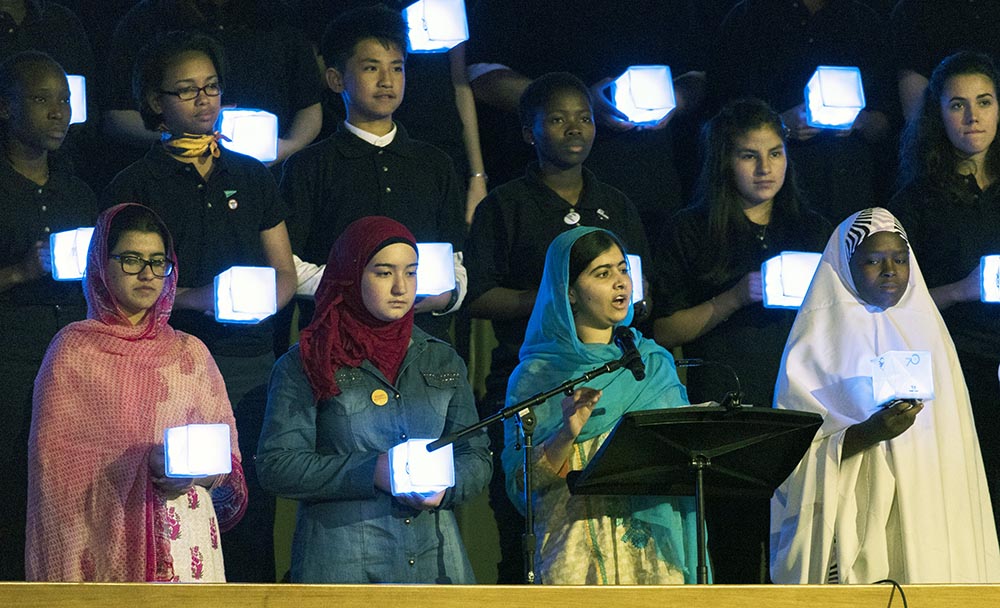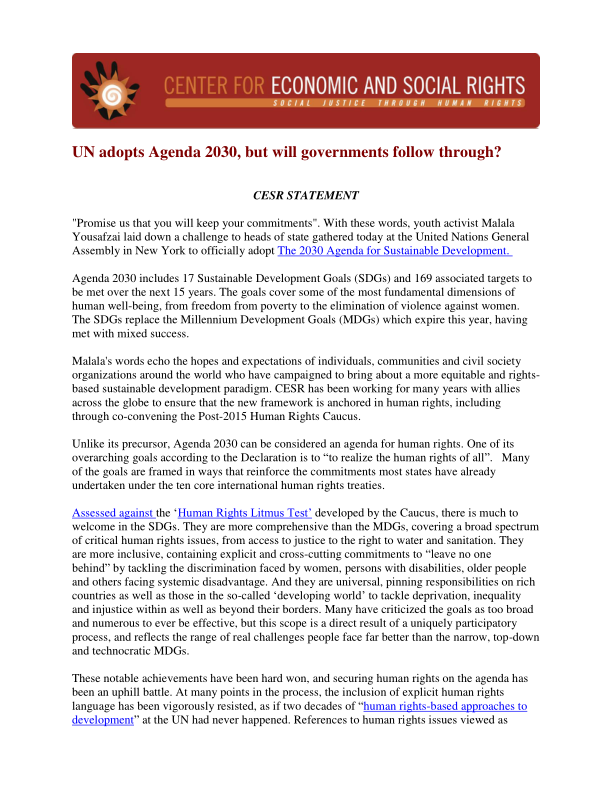CESR STATEMENT
 "Promise us that you will keep your commitments". With these words, youth activist Malala Yousafzai laid down a challenge to heads of state gathered today at the United Nations General Assembly in New York to officially adopt The 2030 Agenda for Sustainable Development.
"Promise us that you will keep your commitments". With these words, youth activist Malala Yousafzai laid down a challenge to heads of state gathered today at the United Nations General Assembly in New York to officially adopt The 2030 Agenda for Sustainable Development.
Agenda 2030 includes 17 Sustainable Development Goals (SDGs) and 169 associated targets to be met over the next 15 years. The goals cover some of the most fundamental dimensions of human well-being, from freedom from poverty to the elimination of violence against women. The SDGs replace the Millennium Development Goals (MDGs) which expire this year, having met with mixed success.
Malala's words echo the hopes and expectations of individuals, communities and civil society organizations around the world who have campaigned to bring about a more equitable and rights-based sustainable development paradigm. CESR has been working for many years with allies across the globe to ensure that the new framework is anchored in human rights, including through co-convening the Post-2015 Human Rights Caucus.
Unlike its precursor, Agenda 2030 can be considered an agenda for human rights. One of its overarching goals according to the Declaration is to “to realize the human rights of all”. Many of the goals are framed in ways that reinforce the commitments most states have already undertaken under the ten core international human rights treaties.
Assessed against the ‘Human Rights Litmus Test’ developed by the Caucus, there is much to welcome in the SDGs. They are more comprehensive than the MDGs, covering a broad spectrum of critical human rights issues, from access to justice to the right to water and sanitation. They are more inclusive, containing explicit and cross-cutting commitments to “leave no one behind” by tackling the discrimination faced by women, persons with disabilities, older people and others facing systemic disadvantage. And they are universal, pinning responsibilities on rich countries as well as those in the so-called ‘developing world’ to tackle deprivation, inequality and injustice within as well as beyond their borders. Many have criticized the goals as too broad and numerous to ever be effective, but this scope is a direct result of a uniquely participatory process, and reflects the range of real challenges people face far better than the narrow, top-down and technocratic MDGs.
These notable achievements have been hard won, and securing human rights on the agenda has been an uphill battle. At many points in the process, the inclusion of explicit human rights language has been vigorously resisted, as if two decades of “human rights-based approaches to development” at the UN had never happened. References to human rights issues viewed as politically contentious despite being internationally agreed - such as the right to development, women’s sexual and reproductive rights and freedom from discrimination on grounds of sexual orientation or gender identity - became a bargaining chip in the negotiations this summer. There was considerable push-back from industrialized countries to efforts to put economic inequality, wealth redistribution, corporate accountability and the structural obstacles to sustainable development on the agenda, resulting in weak compromises and worrisome contradictions in the final outcome document.
While the culmination of the SDG process gives human rights advocates much to celebrate , it has failed to deliver on our most fundamental expectation: that of a paradigm change in development. For all the talk of “transformative shifts”, the vision of development underpinning the SDGs remains premised on old models of industrial production and consumption, and export-oriented growth. While there are important commitments in the SDG targets around debt, progressive taxation, illicit financial flows and reforming global economic governance, the agenda does little to alter the structural inequities of the dominant neoliberal economic system, which have perpetuated the economic and social exclusion that the Pope today decried as “a grave offence to human rights”. However, it is clear that the goals cannot be met simply by tinkering around the edges or business-as-usual economics – structural changes are a non-negotiable necessity for success, especially for goals on inequality, climate change and gender.
Moreover, the impact of the commitments to which states have agreed will depend on the steps taken to implement them, track progress and hold those in power answerable. Here, big questions remain unanswered. The July Financing for Development agreement in Addis Ababa stopped far short of the concrete, time-bound commitments necessary to unleash equitable, sufficient and accountable financing for sustainable development, due to the evasion and strong-arm tactics of the rich countries. Meanwhile, trade agreements that privilege the rights of corporations over those of citizens are being negotiated behind closed doors, and undue corporate influence over development plans and strategies grows apace.
The framework envisaged in the final agreement for monitoring and review of implementation of the post-2015 agenda is tentative, vague and entirely voluntary, suggesting that we haven’t fully learnt the lessons of the MDGs, the shortfalls of which have been widely attributed to an accountability deficit. Huge challenges therefore remain in building people-centered and credible monitoring platforms, from the local to the global level, beyond official government reports and proclamations of progress. A fundamental foundation in this effort will be the selection of indicators to measure progress towards the targets, against which governments can be held accountable.
There is therefore much that remains to be done at the national and international levels to unleash the potential of the SDGs as a vehicle for human rights realization and accountability, and to ensure that other policy processes do not run counter to the goals adopted today.
These goals matter for human rights because, despite their flaws, they are likely to have more traction and sway over social, economic and development policy at the national, regional and global levels than other international commitments states have agreed to on economic, social and other human rights, especially in terms of resource allocation and aid.
It remains to be seen whether the adoption of the SDGs will represent "a defining moment in human history", as the UN Secretary General Ban Ki-Moon described it today. But it has opened a potentially important space to hold governments accountable over the next 15 years for what they are doing to fulfill the rights of those facing poverty, deprivation and injustice in all countries of the globe. For this potential to be realized, civil society must be afforded the space, tools and resource needed to hold public institutions and private actors answerable. As Salil Shetty of Amnesty International reminded world leaders in a powerful keynote speech today, “You cannot adopt the Sustainable Development Goals and at the same time attack and arrest peaceful protesters and dissenters”. As crucial as civil society’s role was in securing human rights commitments on the agenda, it will be even more indispensable in translating these into action. CESR will continue to work with its allies in the human rights, development and social justice movements to ensure this historic opportunity is not lost.
